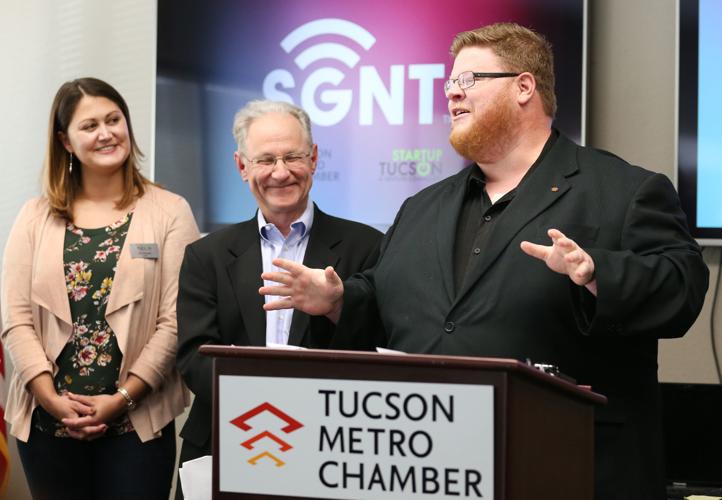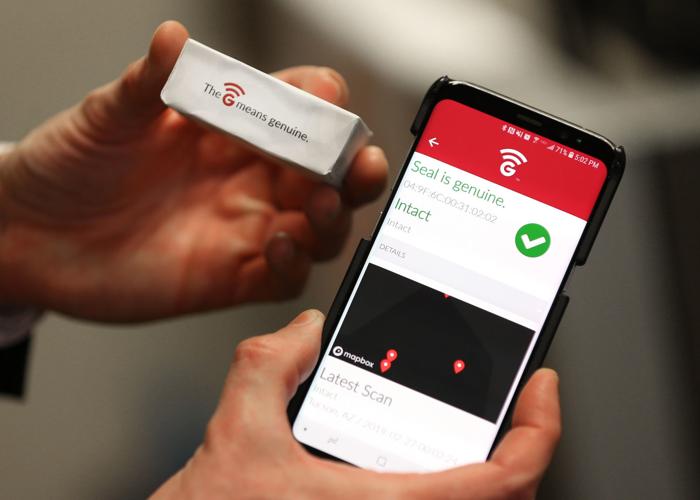Startup Tucson and the Tucson Metro Chamber of Commerce touted a new partnership with a prime example of the kind of results they both want to see: a ribbon-cutting for a tech startup they helped nurture.
The partnership includes a new Students & Startups membership level at the chamber that includes discounted dues, mentorship opportunities, access to the chamber’s association health-care plan, and joint programs with Startup Tucson, a nonprofit agency dedicated to helping entrepreneurs succeed.
One startup, SGNT Inc., benefited as the two groups piloted the partnership idea last year, and on Tuesday the formal collaboration was announced as the company cut the ribbon on its new office at the Tucson Metro Chamber’s headquarters building downtown.
Founded last summer, SGNT is working to commercialize a new technology that builds on current radio-frequency ID tags — long used for such things as inventory control — to monitor the security and authenticity of goods with radio-frequency ID tags.
SGNT CEO Emil Tremblay, a computer software engineer who started the company after moving to Tucson from Alberta, Canada, last year, said he was amazed by the support he received after initially attending a Startup Tucson mixer in April.
The nonprofit Startup Tucson runs a range of programs and events to help entrepreneurs build their businesses, drawing mentors and other resources from the local community.
“I didn’t know anyone in the business community here,” Tremblay said. “In 10 months, we’re now here at a press conference and our new office is in the building.”
In October, SGNT won the People’s Choice Award presented by Tucson Electric Power at the IdeaFunding pitch competition hosted by Startup Tucson.
Tremblay, a specialist in radio-frequency identification (RFID), adapted the technology to a patent-pending system that monitors the seal on a package or container to allow users to tell whether a product is authentic and spot tampering.
Tremblay said Startup Tucson and the chamber helped he and co-founder Tommy Rompel assemble a management team and develop its business plan.
With that help, SGNT was able to win a $224,470 National Science Foundation grant to further research and develop its RFID technology.
SGNT’s story is just beginning, but Startup Tucson’s chief said support from the larger business community can be key for startups.
“The support of the broader business community for entrepreneurs in the early stages of development is critical to their scalability,” Startup Tucson CEO Liz Pocock said.
Amber Smith, president and CEO of the Tucson Metro Chamber, said the partnership is part of the chamber’s effort to evolve and collaborate to serve a broader business community.
“It makes sense for the chamber’s evolution to include the dynamic startup community to serve businesses in all stages of their growth,” she said.
SGNT says its technology is a solution to the problem of counterfeit goods, which are of particular concern to the pharmaceutical industry and the U.S. Department of Defense. Globally, the trade in counterfeit goods is estimated at $461 billion annually, SGNT said, citing figures from the U.S. Chamber of Commerce.
Rompel said SGNT’s technology constantly monitors a special seal and sends updates via RFID to a smartphone or other devices, which display whether an item’s seal is genuine and is intact.
The seals consist of a barrier or wrap that can be placed inside or out, and they don’t require power to record security data.
“Once you open it, you can’t put it back together, so we can prove that it’s intact since it left the factory,” Rompel said. “RFID is powering our stuff, but our patent-pending technology is to create that barrier around something.”
For more information on SGNT or to contact the company, go to the company’s website at www.sgnt.io.





